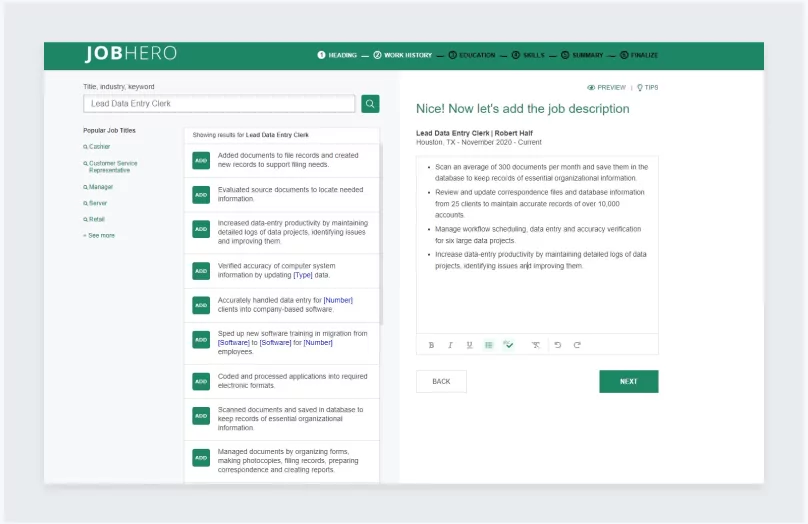What is a Medical Officer?
Medical Officers, often know as Chief Medical Officers, are physicians who are typically in charge at hospitals. Medical Officers serve as advisors on health issues and disease control, provide medical support, discover inconsistencies and investigate problems. Medical Officers can find work overseeing clinical programs where clinical trials take place and require recruiting of individuals to participate in the trials.
Standard 12-hour shifts are common in this profession, and being on your feet most of the time is expected. According to the Bureau of Labor Statistics, demand for Medical Officers, which are housed in the category of Chief Executives, is expected to grow 6 percent through 2024, amounting to more than 4,100 annual openings, including the formation of new organizations or expansion of those already established.
Want to add value to your job application? Using a professional cover letter builder can help you stand out from the competition. Use ours to build a stand out letter that will get you noticed.

Create your professional resume in just minutes.
- Choose from 20+ recommended templates
- Add pre-written experiences, skills and summary
- Download and send
Medical Officer Duties and Responsibilities
Tracking and Evaluating Clinical Data
Evaluating the Latest Medical Programs and Research
Planning, Implementing and Directing Clinical Services
Making Program Recommendations or Revisions
Maintaining Accurate Documentation
Medical Officer Skills
Medical Officers, with their excellent interpersonal skills, can work just as well with a team of healthcare professionals as they do when they consult with individuals. In addition, they are problem solvers who can think outside the box and find the solutions to issues that become stumbling blocks for others. Employers seek Medical Officer candidates with these general skills and the following ones.
Core skills Based on our research, employers are seeking Medical Officers with these core skills
- Dedication to patient safety and quality of healthcare
- Commitment to organization’s values and vision
- Ability to lead standardization of care
- Inspirational to the healthcare team
- Superb listening skills
Advanced skills While most employers did not require the following skills, some job listings included them as preferred. Having these as part of your Medical Officer skill set will offer you more career options.
- Proven ability to lead a team of healthcare professionals with integrity and respect
- A successful track record of fostering teamwork and collaboration among physicians
- Experience and successful leadership of disease management programs
Tools of the Trade
- Spreadsheets, such as those found in Microsoft Excel
- Medical information databases
- Diagnostic medical equipment
- Scheduling software
- Medical reference guides
GO PRO
Choose from fully customizable
GET PAST THE BOTS
Ensure compatibility with Applicant Tracking Systems
LOOK YOUR BEST
Save time with sleek and stylish professional design templates

Medical Officer Salary
Medical Officer Resources
We consulted the Internet to locate some additional valuable industry resources to aid you in your career exploration of Medical Officer. From networking connections to industry groups, you’ll find this list helpful.
On the Web
What Makes a Chief Medical Officer Effective?An article about which leadership qualities can help make a CMO a success.
The Evolving Role of the CMOAs healthcare transforms, so does the role of the Chief Medical Officer. This whitepaper explores the changes and their impact.
On LinkedIn
Vipul Mankad, M.D.Dr. Mankad has a distinguished medical career in the fields of academic medicine, clinical practice, leadership and policy expertise that have aided in building successful healthcare systems and medical education institutions globally.
Marvin D. Seppala, M.D.Dr. Seppala is the CMF at Hazelden Betty Ford Foundation. He works as an adjunct Assistant Professor in the field of addiction studies and also has published books in the field.
Industry Groups
AMGAThis group’s primary interest is empowering the advancement and delivery of high quality healthcare.
Chief Medical Officer’s GroupSponsored by the American Association of Medical Colleges, the CMOG offers information, networking and professional development opportunities for Chief Medical Officers.
Medical Officer Books
Surviving in an Ever-Changing Healthcare Industry by Donna GaultWritten by a former RN with almost 50 years of experience, this book gives doctors, nurses and patients a look at some of the challenges facing healthcare today and how to avoid the pitfalls.
Ethical Dimensions in the Healthcare Professions by Regina F. DohertyThis book offers a sixstep process for recognizing, understanding and resolving ethical issues that arise in healthcare.
Medical Officer Resume Help
Explore these related job titles from our database of hundreds of thousands of expert-approved resume samples:



